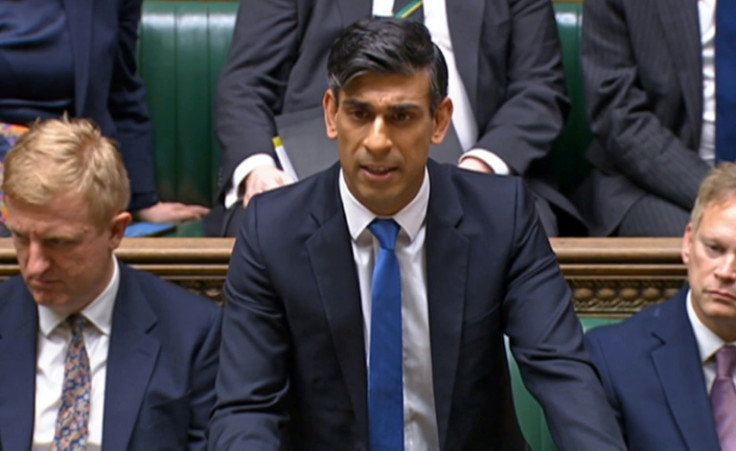What Does UK Entering Recession After Steeper-Than-Expected Fall In GDP Mean For Brits
While recessions of the past, notably during the global financial crisis of 2008-2009, were protracted and severe, indications suggest that this downturn may be milder and short-lived.

The United Kingdom's economic landscape has taken a bleak turn as recent figures from the Office for National Statistics (ONS) confirm the nation has officially entered a recession.
This designation is based on two consecutive quarters of economic contraction, with the latest data revealing a 0.3 per cent shrinkage in gross domestic product (GDP) during the final quarter of 2023.
The downturn, which is more pronounced than economists' projections of a 0.1 per cent contraction, follows a similarly negative growth rate of 0.1 per cent in the preceding quarter.
While these figures are preliminary estimates that will be revised as more data becomes available, they provide a troubling picture for both policymakers and citizens.
Unlike earlier recessions, such as the prolonged downturn during the global financial crisis of 2008-2009, the current economic downturn is expected to be light and brief. However, its consequences are enormous, with the ability to influence Bank of England decisions on interest rates and borrowing prices.
The economic downturn poses a particular challenge for Prime Minister Rishi Sunak and the Conservative government, who have prioritised economic growth as a key pillar of their agenda. The erosion of consumer spending power due to a cost-of-living crisis, characterised by high inflation and escalating energy expenses, has contributed to the economic contraction.
Inclement weather conditions, including above-average rainfall and heightened wind speeds, have further dampened economic activity, impacting sectors such as retail, construction and government expenditure.
Retail sales, a crucial indicator of consumer confidence and economic health, plummeted to levels not seen since the depths of the COVID-19 lockdown in January 2021, exacerbating the economic slowdown.
Moreover, the UK economy has grappled with persistent challenges in productivity, exacerbated by the lingering effects of the pandemic. High levels of long-term sickness absence and labour market disruptions, including strikes across various industries, have hindered efforts to stimulate productivity growth.
In response to the sobering economic data, Chancellor Jeremy Hunt pointed out the urgency of addressing high inflation, citing it as the primary impediment to economic recovery. While acknowledging the current constraints on growth, Hunt expressed optimism about the British economy's prospects, pointing to forecasts of strengthened growth, rising wages outpacing inflation, reduced mortgage rates and low unemployment.
Hunt said: "But there are signs the British economy is turning a corner; forecasters agree that growth will strengthen over the next few years, wages are rising faster than prices, mortgage rates are down and unemployment remains low. Although times are still tough for many families, we must stick to the plan – cutting taxes on work and business to build a stronger economy."
Despite ongoing hardships for many households, he highlighted the importance of adhering to the government's economic strategy, which prioritises tax cuts and business incentives to foster resilience and growth.
However, opposition figures have been quick to criticise the government's handling of the economic downturn. Labour leader Sir Keir Starmer condemned what he described as the Conservatives' failure to reverse years of economic decline, asserting that working people would bear the brunt of the recession's impact.
Starmer called for a change in leadership, arguing that only the Labour Party could deliver the transformative policies needed to steer the country toward economic recovery and prosperity.
On X, Labour leader Sir Keir Starmer wrote: "Rishi Sunak has failed to turn the corner on 14 years of Tory economic decline. Britain is hit by a recession and it's working people who will pay the price. It's time for change. Only Labour will deliver it."
The UK's economic woes have been further compounded by broader global trends and significant events, most notably Brexit. The decision to leave the European Union has had far-reaching consequences for trade, migration and investment, exerting downward pressure on economic performance.
Reduced trade intensity, diminished labour supply due to immigration restrictions and heightened uncertainty surrounding investment decisions have all contributed to the UK's economic challenges in the post-Brexit era.
Estimates suggest that Brexit has already led to a substantial reduction in real GDP relative to a scenario where the UK remained an EU member, resulting in a notable decline in per capita income.
What does it mean for the people?
During a recession, the economic landscape undergoes significant changes that can impact individuals and communities in various ways. With less money circulating within the economy, there's a ripple effect felt across different sectors and among different demographics.
For workers, the consequences can be dire. Employers may tighten their budgets, resulting in fewer job opportunities and stagnant wages. As businesses struggle to stay afloat or downsize their operations, layoffs become more common, leading to increased unemployment rates. This not only affects individuals directly but also has broader implications for consumer confidence and spending patterns.
For those seeking financial assistance or considering major purchases like a mortgage or loan, navigating the lending landscape during a recession can prove challenging. Banks and financial institutions often tighten their lending criteria, making it harder for individuals to secure credit or favourable terms for borrowing.
Moreover, the impact of a recession is rarely evenly distributed across society. Vulnerable populations, including those reliant on benefits or in precarious employment situations, are often disproportionately affected.
Without sufficient savings or access to stable employment, these individuals may face heightened financial insecurity and difficulty meeting basic needs.
© Copyright IBTimes 2025. All rights reserved.






















